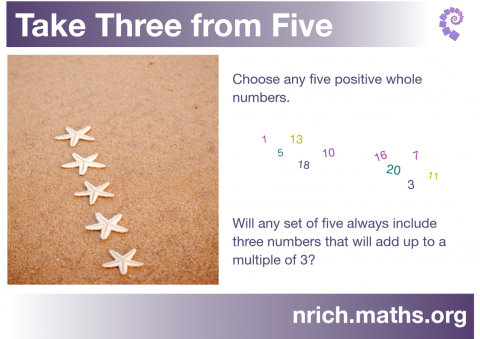Take Three From Five Poster
Problem
Student Solutions
Yes, any set of five whole numers will always include three numbers which add up to a multiple of 3.
Why?
Imagine trying to find five whole numbers which don't include three numbers that add up to a multiple of 3.
Three multiples of 3 add up to a multiple of 3, so we can use maximum two multiples of 3.
Three numbers that are 1 more than a multiple of 3 add up to a multiple of 3.
To represent a number 1 more than a multiple of 3: 
e.g. 13 
Three numbers that are 1 more than a multiple of 3: 
So we can use maximum two numbers that are 1 more than a multiple of 3.
Three numbers that are 2 more than a multiple of 3 add up to a multiple of 3: 
So we can use maximum two numbers that are 2 more than a multiple of 3.
So we could have two multiples of 3, two that are 1 more than multiples of 3, and one that is 2 more than a multiple of 3 (or a different arrangement of 2, 2, 1).
However, that will always include at least one of each type of number. Those add up to a multiple of 3: 

